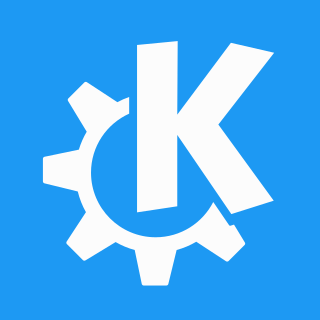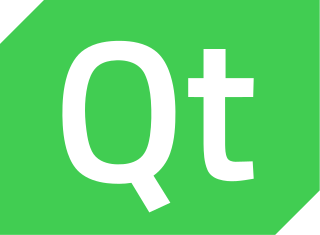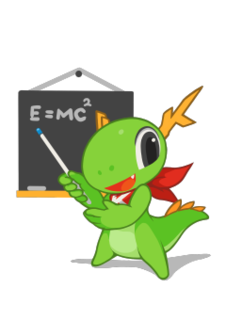
KDE is an international free software community that develops free and open-source software. As a central development hub, it provides tools and resources that allow collaborative work on this kind of software. Well-known products include the Plasma Desktop, Frameworks and a range of cross-platform applications like Krita or digiKam designed to run on Unix and Unix-like desktops, Microsoft Windows and Android.

Konqueror is a free and open-source web browser and file manager that provides web access and file-viewer functionality for file systems. It forms a core part of the KDE Software Compilation. Developed by volunteers, Konqueror can run on most Unix-like operating systems. The KDE community licenses and distributes Konqueror under GNU GPL-2.0-or-later.

Calligra Suite is a graphic art and office suite by KDE. It is available for desktop PCs, tablet computers, and smartphones. It contains applications for word processing, spreadsheets, presentation, databases, vector graphics, and digital painting.

Qt is a widget toolkit for creating graphical user interfaces as well as cross-platform applications that run on various software and hardware platforms such as Linux, Windows, macOS, Android or embedded systems with little or no change in the underlying codebase while still being a native application with native capabilities and speed.

Scanner Access Now Easy (SANE) is an application programming interface (API) that provides standardized access to any raster image scanner hardware.

Amarok is a free and open-source music player. It is available for Unix-like, as well as for Windows and macOS systems. Although Amarok is part of the KDE project, it is released independently of the central KDE Software Compilation release cycle. Amarok is released under the terms of the GPL-2.0-or-later.

Kontact is a personal information manager and groupware software suite developed by KDE. It supports calendars, contacts, notes, to-do lists, news, and email. It offers a number of inter-changeable graphical UIs all built on top of a common core.

Krita is a free and open-source raster graphics editor designed primarily for digital painting and 2D animation. It runs on Windows, macOS, Linux, Android and Chrome OS. It features an OpenGL-accelerated canvas, colour management support, an advanced brush engine, non-destructive layers and masks, group-based layer management, vector artwork support and switchable customisation profiles. It is written in C++ using Qt.

KDE Software Compilation 4 was the only series of the so-called KDE Software Compilation, first released in January 2008 and the last release being 4.14.3 released in November 2014. It was the follow-up to K Desktop Environment 3. Following KDE SC 4, the compilation was broken up into basic framework libraries, desktop environment and applications, which are termed KDE Frameworks 5, KDE Plasma 5 and KDE Applications, respectively.

Edubuntu, previously known as Ubuntu Education Edition, was an official derivative of the Ubuntu operating system designed for use in classrooms inside schools, homes and communities.

KDE Plasma 4 was the fourth generation of the KDE workspace environments. It consisted of three workspaces, each targeting a certain platform: Plasma Desktop for traditional desktop PCs and notebooks, Plasma Netbook for netbooks, and Plasma Active for tablet PCs and similar devices.

Linux is a family of open-source Unix-like operating systems based on the Linux kernel, an operating system kernel first released on September 17, 1991, by Linus Torvalds. Linux is typically packaged in a Linux distribution.

In computer interface design, a ribbon is a graphical control element in the form of a set of toolbars placed on several tabs. The typical structure of a ribbon includes large, tabbed toolbars, filled with graphical buttons and other graphical control elements, grouped by functionality. Such ribbons use tabs to expose different sets of controls, eliminating the need for numerous parallel toolbars. Contextual tabs are tabs that appear only when the user needs them. For instance, in a word processor, an image-related tab may appear when the user selects an image in a document, allowing the user to interact with that image.

Dolphin is a free and open source file manager included in the KDE Applications bundle. Dolphin became the default file manager of KDE Plasma desktop environments in the fourth iteration, termed KDE Software Compilation 4. It can also be optionally installed on K Desktop Environment 3. It replaces Konqueror as the default file manager for KDE SC 4, but Konqueror can still be used as an alternative file manager.
NEPOMUK is an open-source software specification that is concerned with the development of a social semantic desktop that enriches and interconnects data from different desktop applications using semantic metadata stored as RDF. Between 2006 and 2008 it was funded by a European Union research project of the same name that grouped together industrial and academic actors to develop various Semantic Desktop technologies.

The KDE Education Project develops free educational software based on the KDE technologies for students and parents. These educational software is translated into more than 65 languages, so that users can access them without any problems. The KDE-Edu project also provides free software educational to support and facilitate teachers in planning lessons.

KHangMan is an educational computer game designed for young children based on the classic Hangman game. It is part of the KDE Software Compilation, specifically, in the kdeedu package.

Minesweeper is a single-player puzzle video game. The objective of the game is to clear a rectangular board containing hidden "mines" or bombs without detonating any of them, with help from clues about the number of neighboring mines in each field. The game originates from the 1960s, and it has been written for many computing platforms in use today. It has many variations and offshoots.

Kanagram is an educational game that creates anagrams, re-assortment of letters in a word, and the user needs to guess what the original word is. It is licensed under the GNU Public License v2, and it is part of the kdeedu package, and the user interface is designed to be approachable even by very young children. There is no time limit or limitations at attempts, and a hint system is built in.

WikiToLearn is a collaborative, international, free knowledge project, run entirely by volunteers, and dedicated to creating free and accessible textbooks for higher education. In December 2013, it joined the KDE Project through its incubation process with multiple sponsors like Wikimedia Italia.



















